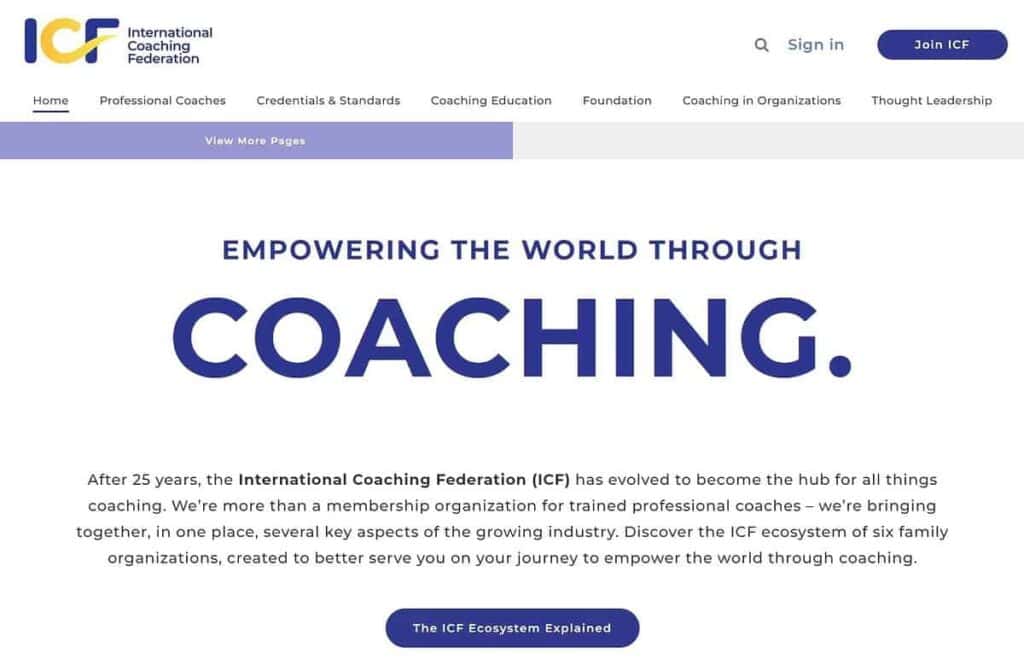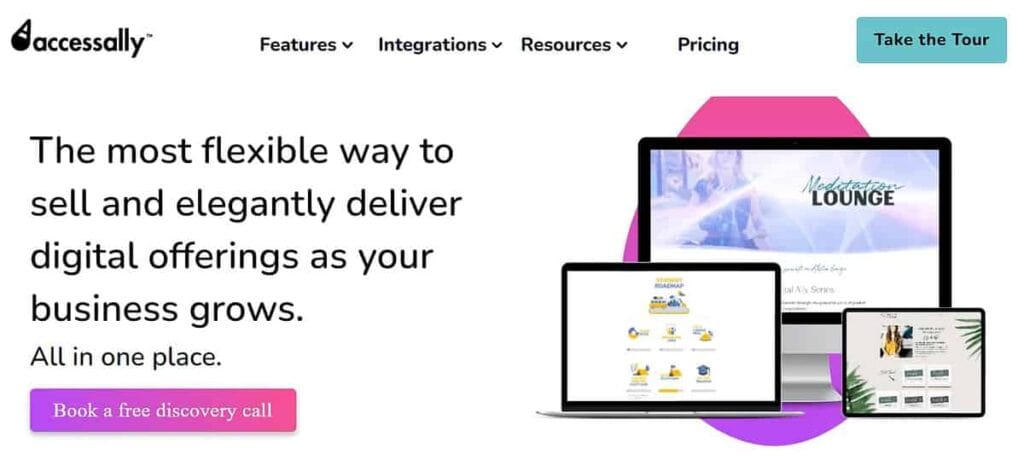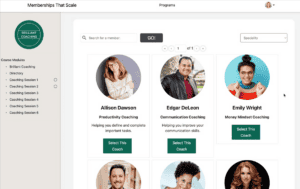Interested in launching a lucrative career as an online executive coach? Coaches work closely with clients and develop problem-solving strategies – but getting started isn’t always easy.
There are lots of factors to consider before launching into a coaching career. Rushing into things without a plan can leave you feeling overwhelmed.
So, in this article, we’ll take an in-depth look at what it takes to become a successful online executive coach and the steps you’ll need to take to get started.

What is an executive coach?
Let’s begin with the basics! An executive coach works with business leaders and high-level professionals, offering guidance and support to help them set and achieve goals, nurture skills, and realize their full potential.
The coaching process spans several areas, including leadership, communication, decision-making, time management, and strategic thinking.
The nature of a coaching role also means that most executive coaches work on a one-on-one, in-person or virtual basis with their clients, meeting for regular sessions over several weeks or months, and nurturing a confidential relationship.
Together, a coach and client will identify goals, develop strategies to achieve them, and highlight additional areas of improvement.
This thorough process ensures that client growth remains ongoing – and coaches also provide clients with insightful feedback to support this.
Executive coaching vs. leadership coaching vs. consulting
Despite sharing similarities with leadership coaching and consulting, executive coaching is a distinct discipline with several distinguishing factors.
Executive coaches work with individual clients (usually professional executives or leaders) and the long-term relationship focuses on developing a coaching model that furthers their personal growth.
Leadership coaches also help their clients to develop skills (like communication and comprehension).
However, leadership coaches work with clients across all professional levels, nurturing qualities that will benefit them and their colleagues.
As a result, a lot of these coaches focus on how to build high-performance teams.
Consultants are tasked with solving a specific problem within an organization rather than actioning a tailored plan to develop a client’s growth.
The career is less people-oriented and more focused on problem-solving within areas like strategy, operations, and finance.
What are the benefits of executive coaching?
Executive coaches tackle all sorts of dynamic challenges to support their clients – so let’s take a look at the benefits in more detail.
Benefits for the client
- Improved performance – Working with an executive coach to identify areas of improvement and solutions to workplace challenges is reflected in the client’s job performance.
- Personal growth – Coaches help clients improve their interpersonal communication skills and develop their emotional intelligence, enabling them to maintain healthy social relationships with peers and become more effective leaders.
- Increased self-awareness – Clients gain deeper insight into their leadership style by frequently evaluating their strengths and potential. As a result, clients relate better with team members.
- Enhanced decision-making – Clients learn how to make confident decisions that consider the perspectives of their team members and incorporate factors like information analysis.
- Accountability and support – Setting a realistic goal and implementing the steps to reach it is an integral part of the coaching process. Coaches also encourage clients to hold themselves responsible for their progress and maintain compliancy throughout.
Benefits for the coach:
- Personal fulfillment – Helping others meet their goals and realize their full potential is hugely rewarding!
- Professional growth – Because each client comes from a unique background, coaches get to explore a variety of challenges, perspectives, and opportunities to grow within the role.
- Ongoing learning and development – Executive coaches rely on principles of psychology, best business practices, and leadership techniques to provide a superb service – and the constant evolution in these areas means that there’s always something new to learn.
- Financial rewards – Executive coaching is a high-ticket service, with a two-hour session costing, on average, $1,100. A coach with a loyal client base can therefore earn a comfortable living.
- Flexibility – Executive coaches are typically able to dictate their working hours and work autonomously. This flexibility also allows coaches to maintain a healthy work/life balance.
What do you need to be a great executive coach?
There’s no single predefined path to becoming a successful executive coach – but there are important factors that can help you on your way.
Qualifications, education, courses, and certifications
Currently, there are no mandatory executive coaching qualifications – and this has its pros and cons.
Without an official qualification (like a bachelor’s degree), and thanks to a lack of industry regulations, it’s difficult to determine whether aspiring coaches can do the job.
On the other hand, the lack of an official qualification means that anybody can become an executive coach regardless of their schooling.
However, arming yourself with relevant certifications signposts your expertise and capabilities.
An executive coaching certification equals credibility, which will appeal to clients, so it’s in a coach’s best interests to work toward one.
Executive coaches can pursue the following official certifications:
- Associate Certified Coach (ACC) Credential – You’ll need 60+ hours of coaching education and 100+ hours of experience to be eligible for an ACC, and undertake an exam and evaluation.
- Professional Certified Coach (PCC) Credential – The PCC requires 125+ hours of coaching education and 500+ hours of experience, then an exam and evaluation.
- Master Certified Coach (MCC) Credential – You’ll need a PCC for this, as well as more than 200 hours of coaching education and more than 2,500 hours of coaching experience. Evaluation is based on two coaching sessions and an exam.

The above credentials have been approved by the International Coaching Federation (ICF) – an organization known for its exacting standards when it comes to validating coaching courses and professionals.
If you’re interested in executive coach training, we’d recommend ensuring that it’s ICF accredited as an Approved Coach Training Program (ACTP) or an Approved Coaching Specific Training Hours (ACSTH).
Experience
Experience in the areas below can also benefit your budding coaching career:
- Business and leadership – Most of your clients will be from the business world, which means it’s important to understand operations, entrepreneurship, and the different roles within a company. Knowing your client’s responsibilities makes it easier to provide tailored coaching.
- Coaching and psychology – Coming from a psychology, counseling, or coaching background is incredibly valuable to coaches working one-on-one with clients.
- Communication – Transparent communication allows coaches to build rapport with clients, discuss their needs, and discuss how they’ll meet their objectives.
- Understanding of organizational development – Leaders make decisions that impact the wider team. So, a coach needs to understand team dynamics and company culture, and confidently tackle complex organizational challenges.
- Setting and achieving goals – Your past experiences, education, and the challenges you’ve overcome can help a client achieve their own goals. Draw on your strengths to offer insightful feedback!
Professionalism
Executive coaches work with business owners, high-level professionals, and other executives – so, maintaining the following standards of professionalism is critical.
- Ethical standards – Clearly outline what a client can expect from your sessions. This includes the type of coaching, fees, and potential conflicts of interest. Business coaches must also maintain complete client confidentiality.
- Continuous learning – Keeping up with new trends, research methodologies, and best practices means that you’re always providing clients with the best chance of success. Enroll in professional development opportunities and maintain a network of industry contacts, including colleagues and clients who can offer advice and feedback.
- Communication – Practice active listening and ask open-ended questions to pinpoint a client’s specific needs and obstacles, and deliver concise feedback.
- Business acumen – Clients hail from different roles and industries, with different experiences, which means that a career coach needs to be aware of key business practices. This acumen also helps a coach market their services and expand their client roster.
- Cultural awareness – Practice sensitivity and open-mindedness when working with clients, and treat cultural differences with respect.
Executive coaching skills
An executive coaching career is filled with unique challenges – and here are the core competencies you’ll need to find effective solutions:
- Active listening – Pay close attention to a client’s verbal communication and non-verbal communication (including tone, body language, and gestures) to help them succeed.
- Asking powerful questions – Pose open-ended questions to explore challenges in more detail and deepen your insights, as well as reenergize your process.
- Providing feedback – There’s an art to providing good feedback; it should be concise and constructive, pinpoint areas of improvement and strengths, and contain specific, actionable steps that the client can take.
- Goal-setting and action planning – Whether a goal is complex or simple, a coach needs to break it down into manageable steps, scout out obstacles, and factor them into the strategy.
- Empathy and emotional intelligence – Clients rely on coaches for support that’s professional, compassionate, and tailored to their specific needs. Sensing emotions and responding accordingly is critical to a coach’s success.
Build Your Own Teaching Ecosystem, Customized to Reflect Your Teaching Style.
With AccessAlly, you’re creating your own platform to run courses, memberships, and communities on.
 See it in action
See it in actionHow to become an executive coach
A successful executive coach has a combination of the right training, experience, and accreditations.
Below, we’ll dive into the practical steps you can take to get your career off the ground.
Develop an executive coaching practice
First, develop a practice that meets your client’s needs. This includes:
Identify your niche
Ask what unique challenges your target audience faces and how you’ll help them overcome them. If you’re unsure, it’s a good idea to identify client needs with market research.
Develop your brand
A well-defined brand helps you to attract clients and represent your service effectively.
Maintain an active presence on social media, develop a professional website, and produce marketing materials.
Pricing and business model
Consider your delivery methods and experience when deciding on how much to charge for your services – and check out similar payment structures within the industry.
Build your expertise
A deep understanding of coaching techniques is, of course, fundamental to any executive coaching career, but it’s also important to delve into business competencies like leadership development, communication, and problem-solving.
This allows you to market your services to the maximum number of clients.
And the best way to build expertise is by being proactive! Enroll in workshops and training programs, check out webinars and seminars, and keep up with the latest industry materials.
It takes time to become a real expert – the process is continuous and requires ongoing learning and development throughout your career.
However, if you’re committed and put the time in, you’ll reap the benefits of your hard work that much quicker.
Set up and market your services
A good marketing strategy will attract and retain clients – allowing you to actually do your job!
Depending on your target market, you can deploy advertising, social media marketing, website content, or content marketing.
- Networking – An active network helps you to reach out to potential and existing clients and makes it easier for clients to recommend you to their peers. Your network is also a great place to strike up relationships with referral sources and strategic partners.
- Social media – Social media platforms like Instagram, Facebook, and LinkedIn allow you to create valuable content that showcases your services and strengths. Be sure to tailor your content to the platform you’re posting on, too!
- Content marketing – Provide deeper insights into your coaching style with blog posts, podcasts, and newsletters. Tell clients exactly what you’ll do for them, share details about your experience and credentials, and answer any questions.
Create your coaching process
Every executive coach needs a robust coaching process – it’s a no-brainer!
This process needs to pinpoint client goals and develop a plan to meet them, and factor in the specific challenges that your client faces.
Here’s how you can develop your coaching process:
- Meet with your client and remember to practice active listening whilst you assess them to determine their goals, needs, and roadblocks.
- Work together to figure out the coaching objectives and small, actionable steps to get there.
- Produce a tailored plan. Include the coaching methodology and tools you’ll use.
- Conduct coaching sessions with your client. Keep them structured and centered around a central objective, and discuss what you can do to overcome its related challenges.
- Keep your client motivated and making forward progress with frequent feedback and support.
- Once you’ve completed the coaching process, evaluate it by measuring its impact on the client’s leadership skills and satisfaction.
- Continue to offer follow-up sessions that reiterate your coaching outcomes. These sessions will also reassure the client that they’re well on their way to reaching their goals!
What tools do you need to support your executive coaching business?
There are all sorts of digital tools that a coach can use to make their life easier. These include:
- Video conferencing tools – Because your clients might be dotted around the globe, a video conferencing tool allows you to support them remotely regardless of incongruent time zones!
- Scheduling tools – Manage meetings and reminders and keep track of booked sessions.
- CRM tools – With a CRM, you can safeguard client information (like contact and relationship details) and track their progress.
- Assessment tools – Monitor your client’s strengths and areas of improvement, and use this information to establish actionable goals.
- Billing and payment tools – Send invoices and receive secure payments.
- Marketing tools – Reach new clients and advertise your service with email marketing, newsletters, blog content, and even social media automations that track engagement.
- Coaching resources – Materials like online courses can support your process and personal learning and development.
If you read that and thought, “that’s a lot of tools” – you’d be right.
Trying to find individual tools that fulfill these functions can get downright confusing, too, and feel as though you’re creating more work for yourself by combining all these disparate bits and pieces.
It’s better to pick a single plugin that allows you to manage, deliver, and promote your executive coaching services.
That’s where AccessAlly comes in!
AccessAlly combines the functionality of dozens of WordPress plugins in a single, all-in-one tool that you can use to build and organize your executive coaching services.
It’s an LMS tool with CRM and membership features, and even integrates with the tools you’re already using.

Here are some more AccessAlly features that can propel your coaching career:
- Coaching portal – Create individual coaching dashboards for your clients to support their one-to-one sessions. Clients can schedule sessions via the dashboard and view coaching materials like recordings, downloads, and workbooks.
- Built-in tracking – Maximize conversion and analyze client behavioral change by keeping track of progress toward their coaching goals.
- Marketing features – One-click upselling and cross-selling features are easy to implement and can boost your revenue.
- Affiliate/referral program – Word-of-mouth marketing helps spread the word about your services, and AccessAlly’s Affiliate System gives clients lots of offerings to talk about.
- Email automation – Remove the drone work from your day and reach the right clients at the right time! This handy feature boosts engagement and conversions, and can collect client feedback.
- Membership creation – Offer clients a paid premium membership in exchange for access to exclusive content.
- Community features – Encourage clients to form a community and share tips, organize group discussions, and keep one another motivated!
Make your executive coaching business a success with AccessAlly
AccessAlly gives you everything you need to support your clients and accelerate your coach training.
And executive coaching is a thoroughly worthwhile career path to embark on – you’ll be helping clients identify goals and create actionable strategies to meet them.
To get started, you’ll need a background in coaching or psychology and demonstrable knowledge of the business world and its relevant skills; communication, problem-solving, decision-making, and so on.
A qualification from an ICF-accredited coaching certification program also goes a long way toward proving your credibility.
You’ll also need to use the right tools for the job.
Don’t overcomplicate things with a fleet of plugins – use AccessAlly to centralize your coaching materials and give clients a quick and straightforward way to book sessions and share notes.
AccessAlly is a must-have tool for any executive coach wanting to elevate their career to the next level.
So, check out AccessAlly’s features and see for yourself how it’ll help you, and your clients, achieve your coaching goals!



